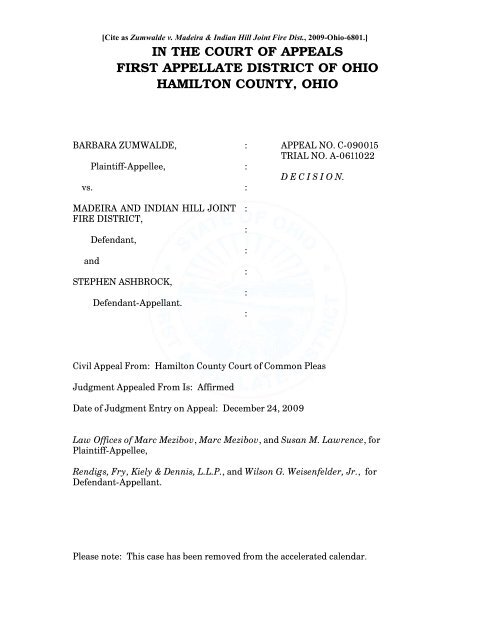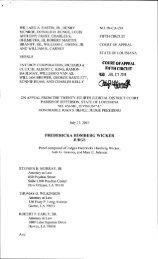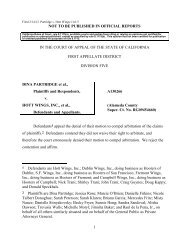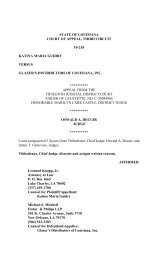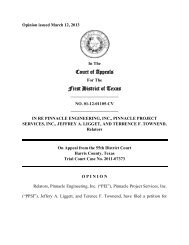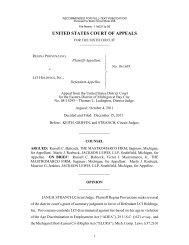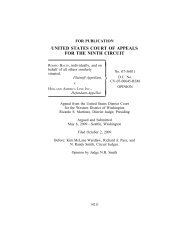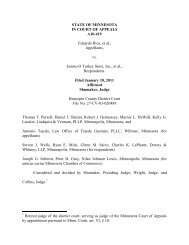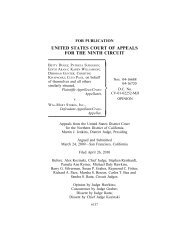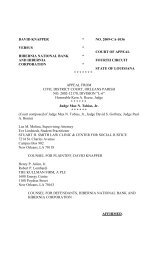Zumwalde v. Madeira & Indian Hill Joint Fire Dist. - Justia
Zumwalde v. Madeira & Indian Hill Joint Fire Dist. - Justia
Zumwalde v. Madeira & Indian Hill Joint Fire Dist. - Justia
You also want an ePaper? Increase the reach of your titles
YUMPU automatically turns print PDFs into web optimized ePapers that Google loves.
[Cite as <strong>Zumwalde</strong> v. <strong>Madeira</strong> & <strong>Indian</strong> <strong>Hill</strong> <strong>Joint</strong> <strong>Fire</strong> <strong>Dist</strong>., 2009-Ohio-6801.]<br />
IN THE COURT OF APPEALS<br />
FIRST APPELLATE DISTRICT OF OHIO<br />
HAMILTON COUNTY, OHIO<br />
BARBARA ZUMWALDE,<br />
vs.<br />
Plaintiff-Appellee,<br />
MADEIRA AND INDIAN HILL JOINT<br />
FIRE DISTRICT,<br />
Defendant,<br />
and<br />
STEPHEN ASHBROCK,<br />
Defendant-Appellant.<br />
Civil Appeal From: Hamilton County Court of Common Pleas<br />
Judgment Appealed From Is: Affirmed<br />
Date of Judgment Entry on Appeal: December 24, 2009<br />
Law Offices of Marc Mezibov, Marc Mezibov, and Susan M. Lawrence, for<br />
Plaintiff-Appellee,<br />
Rendigs, Fry, Kiely & Dennis, L.L.P., and Wilson G. Weisenfelder, Jr., for<br />
Defendant-Appellant.<br />
Please note: This case has been removed from the accelerated calendar.<br />
:<br />
:<br />
:<br />
:<br />
:<br />
:<br />
:<br />
:<br />
:<br />
APPEAL NO. C-090015<br />
TRIAL NO. A-0611022<br />
D E C I S I O N.
SUNDERMANN, Judge.<br />
OHIO FIRST DISTRICT COURT OF APPEALS<br />
{1} Stephen Ashbrock appeals the trial court’s denial of his motion for<br />
summary judgment. We conclude that Ashbrock was not immune from the claims<br />
brought by plaintiff-appellee Barbara <strong>Zumwalde</strong>, so we affirm the judgment of the<br />
trial court.<br />
{2} <strong>Zumwalde</strong> is a firefighter with the <strong>Madeira</strong> and <strong>Indian</strong> <strong>Hill</strong> <strong>Joint</strong> <strong>Fire</strong><br />
<strong>Dist</strong>rict (“the JFD”), and Ashbrock is the fire chief of the JFD. In 2006, <strong>Zumwalde</strong><br />
was suspended for 20 days for allegedly lying on medical questionnaires that she had<br />
submitted to the JFD prior to becoming a full-time firefighter. <strong>Zumwalde</strong> filed a<br />
lawsuit against the JFD and Ashbrock in which she asserted that the suspension had<br />
been ordered in retaliation for an age- and gender-discrimination lawsuit that she<br />
had previously filed against the JFD and Ashbrock, as well as in retaliation for the<br />
workers’ compensation claim that she had filed for a recent injury.<br />
{3} The JFD and Ashbrock filed a motion for summary judgment against<br />
<strong>Zumwalde</strong>, asserting that Ashbrock was immune from the claims, that <strong>Zumwalde</strong><br />
had failed to establish a prima facie case of retaliation, and that the JFD was immune<br />
from <strong>Zumwalde</strong>’s claim for punitive damages. The trial court denied the motion with<br />
respect to whether Ashbrock was immune from the claims and whether <strong>Zumwalde</strong><br />
had established a prima facie case of retaliation. The trial court granted summary<br />
judgment to the JFD on the issue of punitive damages. This appeal followed.<br />
{4} Ashbrock challenges the trial court’s judgment that the existence of<br />
immunity could not be decided as a matter of law. A trial court’s determination that<br />
2
OHIO FIRST DISTRICT COURT OF APPEALS<br />
a political subdivision or its employee is not entitled to immunity under R.C. Chapter<br />
2744 is a final, appealable order. 1<br />
{5} In his sole assignment of error, Ashbrock specifically asserts that the<br />
trial court erred when it refused to conclude as a matter of law that he was immune<br />
from <strong>Zumwalde</strong>’s claims under R.C. 2744.03(A)(6). We review the trial court’s<br />
decision not to grant summary judgment de novo. 2<br />
{6} Under R.C. 2744.03(A)(6), an employee of a political subdivision is<br />
immune from liability, unless one of three exceptions applies: (1) the employee acted<br />
outside the scope of his employment; (2) the employee acted “with malicious<br />
purpose, in bad faith, or in a wanton or reckless manner”; or (3) civil liability is<br />
expressly imposed by statute. The trial court concluded that there existed a genuine<br />
issue of material fact about whether Ashbrock had acted maliciously, in bad faith, or<br />
in a wanton or reckless manner.<br />
{7} Although the trial court began its analysis with R.C. 2744.03 and its<br />
exceptions, we conclude that the analysis should have begun with R.C. 2744.09,<br />
which removes certain types of actions from the purview of R.C. Chapter 2744. R.C.<br />
2744.09(B) provides that R.C. Chapter 2744 “does not apply to * * * [c]ivil actions by<br />
an employee * * * against his political subdivision relative to any matter that arises<br />
out of the employment relationship between the employee and the political<br />
subdivision.”<br />
{8} To determine whether R.C. 2744.09(B) makes R.C. Chapter 2744<br />
inapplicable to <strong>Zumwalde</strong>’s action, we must first determine whether R.C. 2744.09(B)<br />
1 See R.C. 2744.02(C); Sullivan v. Anderson Twp., 122 Ohio St.3d 83, 2009-Ohio-1971, 909<br />
N.E.2d 88, syllabus.<br />
2 Doe v. Shaffer, 90 Ohio St.3d 388, 390, 2000-Ohio-186, 738 N.E.2d 1243.<br />
3
OHIO FIRST DISTRICT COURT OF APPEALS<br />
applies to the claims against Ashbrock individually, and then we must decide<br />
whether the claims made by <strong>Zumwalde</strong> “arise[] out of the employment relationship.”<br />
{9} Ashbrock argues that R.C. 2744.09(B) removes from the purview of<br />
R.C. Chapter 2744 only employee actions against the political subdivision itself.<br />
While the JFD may not be entitled to immunity from the action under R.C.<br />
2744.09(B), Ashbrock contends, he was still entitled to immunity under R.C.<br />
2744.03(A). The Eighth Appellate <strong>Dist</strong>rict agrees with Ashbrock’s view. In<br />
Campolieti v. Cleveland, that court concluded that R.C. 2744.09(B) did not work to<br />
remove immunity from a political subdivision’s employee, because the section<br />
referred only to actions against the political subdivision. 3 On the other hand, the<br />
Fourth and Eleventh Appellate <strong>Dist</strong>ricts have concluded that R.C. 2744.09(B) does<br />
exclude from R.C. Chapter 2744 claims against individual employees if the claims<br />
arise out of the employment relationship with the political subdivision. 4 We<br />
conclude that this latter view reflects a more logical reading of the statute. A political<br />
subdivision’s employee is cloaked with immunity under R.C. 2744.03 by virtue of his<br />
employment with the subdivision. To follow the Eight Appellate <strong>Dist</strong>rict’s conclusion<br />
would mean that the political subdivision’s immunity could be removed for actions<br />
arising out of the employment relationship but that the individual employee’s<br />
immunity would remain. We, therefore, conclude that R.C. 2744.09(B) does apply to<br />
the claims against Ashbrock that arise from <strong>Zumwalde</strong>’s employment relationship<br />
with the JFD.<br />
{10} We next consider whether <strong>Zumwalde</strong>’s claims arise from the<br />
disciplinary action taken against her as an employee of the JFD. In Engleman v.<br />
3 8 th <strong>Dist</strong>. No. 92238, 2009-Ohio-5224.<br />
4 See Nagel v. Horner, 162 Ohio App.3d 221, 2005-Ohio-3574, 833 N.E.2d 300; Ross v. Trumbull<br />
Cty. Child Support Enforcement Agency (Feb. 9, 2001), 11 th <strong>Dist</strong>. No. 2000-T-0025.<br />
4
OHIO FIRST DISTRICT COURT OF APPEALS<br />
Cincinnati Bd. of Edn., this court considered whether a teacher’s claim against a<br />
school board for failing to provide adequate protection was excluded from the<br />
purview of R.C. Chapter 2744 under R.C. 2744.09(B). 5 We concluded that R.C.<br />
2744.09(B) did not remove the claim from the purview of R.C. Chapter 2744,<br />
because intentional torts occur outside the employment relationship. 6<br />
{11} Engleman followed the lead of the Ohio Supreme Court in Brady v.<br />
Safety-Kleen Corp., in which the court held that employer intentional torts occur<br />
outside the employment relationship. 7 Because such torts occur outside the<br />
employment relationship, the court reasoned, a cause of action by an employee for<br />
an employer intentional tort was not preempted by Section 35, Article II of the Ohio<br />
Constitution or by R.C. 4123.74 and 4123.741, which govern the workers’<br />
compensation system in Ohio. 8 But the Ohio Supreme Court’s pronouncement on<br />
intentional torts with respect to the workers’ compensation system is inapposite to<br />
the determination of whether a claim for retaliation “arises out of the employment<br />
relationship between the employee and the political subdivision” for purposes of R.C.<br />
2744.09(B).<br />
{12} We find the reasoning of the Eleventh Appellate <strong>Dist</strong>rict persuasive:<br />
“In many instances, the Brady holding is readily applicable to an immunity case<br />
under R.C. 2744.09(B). For example, if a political subdivision employee initiates a<br />
lawsuit for battery against his or her employer alleging that a supervisor<br />
inappropriately touched him or her, such conduct would clearly be outside of the<br />
employment relationship. This is because once the supervisor made the decision to<br />
5 (June 22, 2001), 1 st <strong>Dist</strong>. No. C-000597.<br />
6 Id.<br />
7 (1991), 61 Ohio St.3d 624, 576 N.E.2d 722, paragraph one of the syllabus.<br />
8 Id.<br />
5
OHIO FIRST DISTRICT COURT OF APPEALS<br />
engage in the inappropriate behavior, he was acting independently from the interests<br />
of the employer and was no longer acting in the course and scope of his employment.<br />
However, we do not believe that the Brady holding acts as a per se bar to any<br />
intentional tort claim by a political subdivision employee against his or her employer.<br />
If the conduct forming the basis of the intentional tort arose out of the employment<br />
relationship, the employer does not have the benefit of immunity pursuant to the<br />
plain language of R.C. 2744.09(B).” 9<br />
{13} This court even acknowledged in Engleman that R.C. 2744.09<br />
removed claims for the intentional torts of invasion of privacy and racial<br />
discrimination from the purview of R.C. Chapter 2744. 10 Here, the claims for<br />
retaliation that were asserted by <strong>Zumwalde</strong> clearly arose out of her employment<br />
relationship with the JFD. That she alleged an intentional tort did not make R.C.<br />
2744.09(B) inapplicable. We limit the holding of Engleman to its specific<br />
determination that intentional-tort claims for failure to provide adequate protection<br />
do not arise out of the employment relationship for purposes of R.C. 2744.09(B).<br />
{14} Our conclusion is in accord with the Ohio Supreme Court’s<br />
acknowledgement that R.C. 2744.09(B) would apply to an employee’s discrimination<br />
lawsuit. 11 And other appellate districts have similarly concluded that R.C.<br />
2744.09(B) does apply to employer intentional torts that arise from the employment<br />
relationship. 12<br />
9 Fleming v. Ashtabula Area City School Bd. of Edn., 11 th <strong>Dist</strong>. No. 2006-A-0030, 2008-Ohio-<br />
1892.<br />
10 Engleman, supra.<br />
11 Whitehall ex rel. Wolfe v. Ohio Civil Rights Comm., 74 Ohio St.3d 120, 123, 1995-Ohio-302, 656<br />
N.E.2d 684.<br />
12 Nagel v. Horner, 162 Ohio App.3d 221, 2005-Ohio-3574, 833 N.E.2d 300 (retaliation and<br />
hostile work environment); Ross v. Trumbull Cty. Child Support Enforcement Agency (Feb. 9,<br />
2001), 11 th <strong>Dist</strong>. No. 2000-T-0025 (invasion of privacy).<br />
6
OHIO FIRST DISTRICT COURT OF APPEALS<br />
{15} We therefore conclude that R.C. 2744.09(B) applies to <strong>Zumwalde</strong>’s<br />
claims. The trial court properly concluded that Ashbrock was not entitled to<br />
immunity as a matter of law under R.C. 2744.03. The judgment of the trial court is<br />
affirmed.<br />
HENDON, P.J., and MALLORY, J., concur.<br />
Please Note:<br />
The court has recorded its own entry this date.<br />
7<br />
Judgment affirmed.


